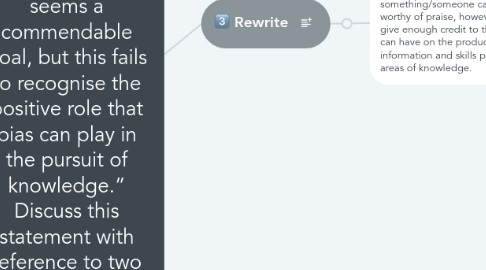
1. Keywords
1.1. Bias
1.1.1. Bias means a strong inclination of the mind or a preconceived opinion about something or someone. A bias may be favourable or unfavourable: bias in favour of or against an idea.
1.1.1.1. This word has both positive and negative connotations - view/perspective vs prejudice/favouritism/proclivity
1.2. Knowledge
1.2.1. Facts, information, and skills acquired by a person through experience or education; the theoretical or practical understanding of a subject.
1.3. Commendable
1.3.1. Worthy of praise.
1.4. Goal
1.4.1. The objective of a person's ambition or effort; an aim or desired result.
1.5. Recognise
1.5.1. Acknowledge the existence, validity, or legality of.
2. Key Phrases
2.1. Positive Role
2.1.1. Having a good effect on
2.2. Avoiding bias
2.2.1. Eliminating any form of pre-existing notion or strong inclination towards a particular person/thing
2.3. Fails to recognise
2.3.1. Does not give enough credit to
2.4. Pursuit of knowledge
2.4.1. Production of facts, information and skills
2.5. Seems a commendable goal
2.5.1. Can be construed as an aim worthy of praise
3. Rewrite
3.1. Eliminating any form of strong inclination of the mind, or a perceived opinion against something/someone can sound like an aim worthy of praise, however, this idea does not give enough credit to the good effect bias can have on the production of facts, information and skills pertaining to certain areas of knowledge.
4. Connections to Classes
4.1. Subject: Economics
4.1.1. AOK: Human Sciences
4.1.2. Claim : In the AOK of Human Sciences, avoiding bias is essential in the pursuit of knowledge
4.1.2.1. RLE/PK Connection : Governments are biased against changes in the value of the currency, eg- country X. Thus, this bias causes them to avoid depreciation of their currency, and new knowledge cannot be produced because the country has never been exposed to a low value of currency
4.1.2.1.1. TOK Concept : Authority/power (power figures can allow their bias to hinder knowledge production)
4.1.2.1.2. Framework Area : Historical development
4.1.3. Counterclaim : Although bias can hinder the production of reliable knowledge in the Human Sciences, it can be useful in gaining knowledge that is more in-depth and accurate to a particular situation
4.1.3.1. RLE/PK Connection : Keynesian vs Neo-classical macroeconomic models. Usage/development of these models are dependant on the specific type of economy, which requires bias. Countries like Singapore that are more 'free-market' economies are more biased towards the Neo-classical model. Whereas countries such as Norway/Sweden would be biased towards a Keynesian model because there is more governmet intervention
4.1.3.1.1. WOK 1 : Memory (pro/against gov intervention based on past experiences, using memory to generate bias)
4.1.3.1.2. Framework Area : Scope and Application
4.2. Subject: Biology
4.2.1. AOK: Natural Sciences
4.2.2. Claim : Presence of bias can cause inaccuracies in knowledge produced in the Natural Sciences
4.2.2.1. RLE/PK Connection : Bias in it's simplest form - seeing different colors on a Biuret's test. The biuret test is a chemical assay that detects the presence of proteins in a sample. The test relies on a color change to confirm the presence of proteins. If proteins are found, the sample will turn violet, from the pre-existing dark blue. It does not take into account people's differeing colour perceptions, colourblind people or those with glasses/contact lenses.
4.2.2.1.1. TOK Concept : Subjectivity
4.2.2.1.2. Framework Area : Methodology
4.2.3. Counterclaim : Though there is a risk of creating inaccurate data in the Natural Sciences due to bias, there are some instances where it can be helpful in the Natural Sciences
4.2.3.1. RLE/PK Connection : Theories have been falsified because people are biased towards a specific opinion, so they experiment the theory to test it, discovering new things - eg phospholipid bilayer structure.
4.2.3.1.1. TOK Concept : Subjectivity
4.2.3.1.2. Framework Area : Methodology
